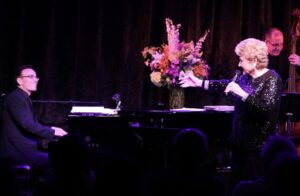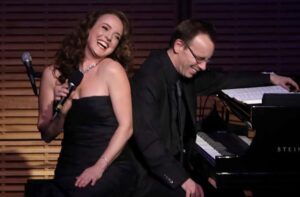Pianist, arranger, and musical director Tedd Firth says he has always had only one goal in life: “I just wanted to play.” He took piano lessons as a child and eventually majored in jazz piano at William Paterson University, later earning a master’s degree at the Manhattan School of Music. During his time in New York City, he found himself playing gigs accompanying singers on the piano.

That’s how the music business often works, says Firth. Musicians fall into opportunities. Someone needs a pianist, and a pianist is available to take the job. That’s how Firth began accompanying Tony-nominated singer and actor Melissa Errico, who will perform her show The Life and Loves of a Broadway Baby on Saturday, Aug. 24 at the Provincetown Theater as part of the Summer 2024 at Town Hall series. They’ve worked together for a dozen years, says Firth, and recorded three albums with larger ensembles, including two collections of music by Stephen Sondheim. A few weeks ago, they recorded some tracks for their first album as a duo.
Other times, says Firth, an accompanist will “sub in” for another who has to miss a performance for some reason. That’s how Firth met Grammy-nominated cabaret star Marilyn Maye; he subbed in for pianist Billy Stritch. On Sunday, Aug. 25, Firth will accompany the 96-year-old Maye for her performance at Provincetown Town Hall.
Firth has been performing with Maye for 17 years. The relationship has endured, he says, because the two get along well, both musically and personally. “At the most basic level,” says Firth, “when accompanying someone, you have to listen to each other.” The rule sounds obvious, he says. “But every so often I’ll hear somebody playing for somebody, and it seems like they’re just not listening.” Listening to a singer breathe is an essential part of the art of accompaniment. “If you’re not keyed into their breath, you’re not going to be with them,” he says.
“Singers sing songs,” says Firth — so it follows that a good accompanist should know a lot of songs. “Some people get into playing jazz because they like improvising and playing solos,” he says. “But I always liked songs. I was always fascinated by the Great American Songbook.” Those musical inclinations made the job of accompanying singers a natural fit.

Firth says he’s comfortable not being the center of attention during performances. “The audience will usually give the singer a little more attention than the accompanist,” he says. “It’s how it should be.” But there’s still a balance between him and the singers he plays with. From his perspective on the bandstand, “I feel like it’s more of a pure duet, where we’re equal partners. In an ideal situation, the person I’m working with is listening to me as well.” That process of mutual listening, he says, gives him more than enough room to express himself.
At a performance with Maye three years ago in an old opera house in Hudson, N.Y., that kind of connection was put to the test. “We were most of the way through the concert when the power went out,” says Firth. “Everything went dark.” For a minute, he says, people were totally confused. Some turned on the flashlights on their phones. Fortunately, the band was made up of acoustic instruments — piano, bass, and drums — so even though the bass amp and the mics on the piano weren’t working, the instruments still made sounds.
“Marilyn didn’t want to stop,” says Firth. “She walked right out into the crowd and started singing to people at their tables.” Up on stage, the band played very quietly, so as not to overpower her voice. It was softer without a mic, but just as captivating.
The situation illustrated one of Firth’s basic beliefs about performance. “Concerts are communal experiences by nature,” says Firth. “When something like that happens, it becomes even more communal. Everybody’s having the same experience: being part of something that we all know was completely unplanned.”

In addition to his accompanist gigs — along with Errico and Maye, Firth regularly works with Bernadette Peters and Brian Stokes Mitchell — Firth has been the musical director for the reunion of the original Broadway cast of Sondheim’s Into the Woods at the Segerstrom Center for the Arts in Costa Mesa, Calif. and for Michael Feinstein’s “Jazz and Popular Song” concert series at Jazz at Lincoln Center. As an arranger and orchestrator, his work has been performed by many major American symphony orchestras, and he’s performed at prestigious venues in New York City including Carnegie Hall, Birdland, the Algonquin, and the Blue Note.
In 2015, Firth performed at the White House for the 50th anniversary of the National Endowment of the Arts. The organizers had chosen music that they thought was uniquely American, he says. “Audra McDonald and Brian Stokes Mitchell sang ‘Wheels of a Dream,’ from the musical Ragtime as a duet,” and President Obama was in the audience, says Firth. “It was a total thrill.”
Like many of his accompanist gigs, says Firth, “most of the stuff I’ve done, I’ve just sort of fallen into.” Being open to chance has worked well for him so far and, looking forward, Firth says he can’t quite imagine starting to chase down further opportunities. “I’ll probably fall into something else at some point that turns out to be pretty cool.”
Beautiful Music Together
The events: Tedd Firth accompanies Melissa Errico and Marilyn Maye
The time: Melissa Errico, Saturday, Aug. 24, 8:30 p.m.; Marilyn Maye, Sunday, Aug. 25, 8:30 p.m.
The place: Errico at the Provincetown Theater, 238 Bradford St.; Maye at Provincetown Town Hall, 260 Commercial St.
The cost: See ptowntownhall.com for ticket information
